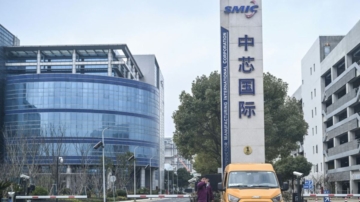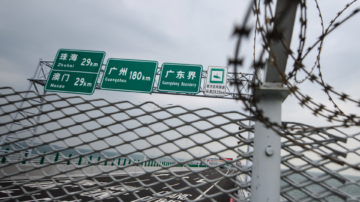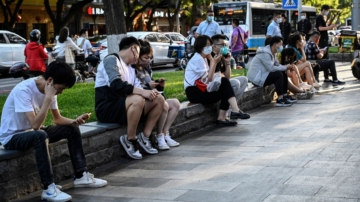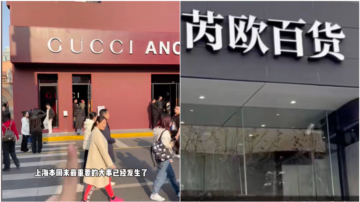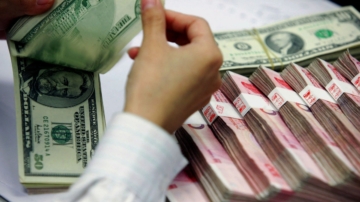【新唐人2013年03月01日訊】2月27號,美國《華爾街日報》發表題為《私人債務猛增為中國埋下炸彈》的文章。文章指出,從2008年以來,中國公共和私人債務超過GDP的2倍,這對任何一個發展中國家都是前所未有的水準,是導致經濟崩潰的定時炸彈。
文章指出,中國經濟一直靠大力投資發展,特別是2008年全球金融危機爆發後,為維持經濟增長,驚慌失措的中共官員們推出了4萬億人民幣的刺激方案,每年新增貸款量已增加了三倍多﹔僅過去12個月新增貸款就達2.75萬億美元,但其中約有一半來自「影子銀行系統」。投資佔中國GDP的比例已從43%升至48%,這對於任何一個大國來說都是空前的記錄。
《華爾街日報》這篇文章的作者,是「摩根士丹利投資管理公司」新興市場部的負責人沙姆(Sharm)。他認為,目前中國公共和私人債務總額超過GDP的2倍,這對任何一個發展中國家都是前所未有的水準。以衡量私人債務增速的最重要指標來看,中國現在已經處於十分危險的地帶。
沙姆還指出,無論是從國際清算銀行給出的指標,還是國際貨幣基金組織給出的指標,中國都將面臨金融危機。
美國「南卡羅來納大學」教授謝田認為,大量從影子銀行貸款是威脅中國社會的一顆炸彈。謝田表示,由於中國金融系統的不完善,中小企業或私人企業無法從國有銀行得到貸款,為維持企業運轉他們只好從利率極高的影子銀行貸款。當企業無法支付這麼高的借貸利率時,企業就會破產或者老闆「跑路」,那麼這些貸款就變成了壞賬。
謝田:「壞賬出現,首先這些地下銀行、地下錢莊、影子銀行他們會大量的破產和倒閉,這就會涉及到很多很多牽扯其中的人,而這些人又可能大量是中小企業主、私人企業者、民營企業、民間企業。他們大批破產或垮臺的話,也會帶來很大的失業、就業的問題。」
謝田指出,如果中國失業率繼續上升或經濟繼續衰退,或者中央政府收緊銀根,都可能引爆這個炸彈,甚至國有銀行都有可能被拖垮。
沙姆還寫道,即使中國能躲過金融危機,也不太可能躲過日益受到債務拖纍的國民經濟增長放緩。實際上,中國約有三分之一的銀行貸款流向投機行為的房地產,出口和工業生產已經放緩。他指出,中國如果要實現經濟再平衡,必須削減投資,降低債務增速。
大陸不少學者也警告中國將出現經濟危機。國務院發展研究中心資源與環境政策研究所副所長李佐軍,在一場內部報告會上的題目就是《2013年中國將爆發經濟危機》。他認為,引發這場危機爆發的可能性有兩個,一個是房地產泡沫破滅,另一個是地方債務危機。
但中共政府內部卻仍認為,中國金融系統或經濟增長幾乎不存在甚麼風險,因為中國外債非常少,還有超過3萬億美元的外匯儲備和龐大的國內儲蓄,可以承擔註銷壞賬的風險。
《新唐人》特約經濟評論員馬傑森也認為,中國銀行都是中共政府所有,即使出現大量壞賬,他們會轉嫁危機,讓全體老百姓來承擔。
《新唐人》特約經濟評論員馬傑森: 「去年經濟發展放緩後,中共的解決辦法也就是靠銀行拚命貸款,也就是給地方政府和大中型企業創造債務,那麼這個債務貸款最終就變成了印鈔。 在過去30多年裡頭,或者中共執政60多年裡,幾次都發生這樣的事,就是讓銀行多印鈔票,把債務變成通脹,最終是老百姓靠通脹來解決中共的債務的問題。」
馬傑森指出,像上個世紀59年到62年的所謂「三年自然災害」,中國餓死3000多萬人。從國外看就是經濟崩潰,但中共既不承認經濟崩潰,也不承認執政有問題。所以,不能用國際規律來看中國問題。
採訪/朱智善 編輯/宋風 後製/蕭宇
U.S. Media on China’s Debt Bomb
On February 27, The Wall Street Journal (WSJ) published
the article, “China Has Its Own Debt Bomb”.
The article pointed out that since 2008, China’s public
and private debts are more than twice its GDP.
This is an unprecedented level in any developing country
and a time bomb for the economy collapse.
The article pointed out that China’s economy
has been relying on heavy development of investments.
Especially after the 2008 global financial crisis,
in order to maintain economic growth,
the panicked Chinese Communist Party’ (CCP) officials
introduced a stimulus package of 4 trillion Yuan.
The annual amount of new loans increased over threefold;
for the past 12 months, the new loans reached $2.75 trillion,
but about half of them came from the ‘shadow bank system.’
The investments share increased from 43% to 48%,
which is an unprecedented record for any country.
The author of the article, Ruchir Sharma, is responsible
for the Emerging Markets department at the Morgan Stanley Investment Management Company.
He believes that now China’s public and private debt
is more than 2 times its GDP, which is an unprecedented level in any developing country.
According to the most important indicators to measure
private debt growth, China is now in a very dangerous zone.
Sharma also pointed out that based on indicators from
the Bank of International Settlements and the IMF, China will face financial crisis.
Professor Xie Tian from the U.S. University of the South
Carolina believes that the large number of loans from shadow banking is a ticking bomb for the Chinese society.
Xie reminded that in China small, medium, or private
enterprises cannot get loans from the state-owned banks.
In order to maintain their business they have to apply
for shadow banking loans with very high interest rates.
When the enterprises cannot pay such high interest rates,
the enterprise will go bankrupt, or the boss will ‘runaway,’ then these loans become bad debts.
Xie Tian: “When the bad debts become too much, these
underground shadow banks will go bankrupt and collapse.
As many people are involved, most of them are probably
owners of medium, small, and private enterprises.
If a large number of them go bankrupt,
there will be a big issue with the unemployment.”
Xie pointed out, if China’s unemployment rate keeps rising,
or the economic recession continues, or the central government tightens the monetary policy,
all these are likely to detonate the bomb,
and even the state-owned banks will collapse.
Sharma also wrote, even if China was able to escape
the financial crisis, it is unlikely to avoid national economic slowdown which comes with the debts.
In fact, about one third of China’s bank loans are involved
in the speculative real estate, whereas export and industrial production have slowed down.
He pointed out, if China wants to balance the economy again,
it has to decrease the investments and growth rate of debts.
Many mainland China scholars have warned
about China’s economic crisis.
Li Zuojun, deputy of State Research Center at the Resource
and Environmental Policy Institute, wrote the article, “The outbreak of economic crisis in China 2013.”
Shown at an internal meeting, the paper talks of two factors,
which can lead to crisis outbreak: the real estate bubble burst, and the local debt crisis.
However, the CCP’s regime still believes,
the financial system and economic growth are not at risk,
because China has so little foreign debts, as well as
over 3 trillion U.S. dollars in foreign exchange reserves,
plus huge domestic savings,
which can absorb the risk of bad debts.
NTD’ special economic commentator, Jason Ma also believes
that if many bad debts appear, they will be passed on to the ordinary people, as the banks are owned by CCP’s regime.
Jason Ma:“After the economic slowdown last year,
the CCP’s solution is to rely on banks to give loans.
This is to create huge debts for the local governments,
and medium and big sized enterprises.
Thus this debt loans eventually became
just printed money.
In the last 60 years, since CCP is in power, this happened
several times, they let the banks print more money,
turn the debts into inflation, eventually relying on imposing
inflation on people to solve CCP’s debt.”
Ma gave as an example China’s “Three Years Great Famine”,
(1959 to 1962,) when over 30 million people died of hunger, from “natural disasters”, as the CCP claims.
Yet, according to independent sources this was a collapse
of the economy, but the CCP never admitted this, nor that it was a ruling problem too.
Thus, one cannot use the international law
to assess and measure China’s problems.
文章指出,中國經濟一直靠大力投資發展,特別是2008年全球金融危機爆發後,為維持經濟增長,驚慌失措的中共官員們推出了4萬億人民幣的刺激方案,每年新增貸款量已增加了三倍多﹔僅過去12個月新增貸款就達2.75萬億美元,但其中約有一半來自「影子銀行系統」。投資佔中國GDP的比例已從43%升至48%,這對於任何一個大國來說都是空前的記錄。
《華爾街日報》這篇文章的作者,是「摩根士丹利投資管理公司」新興市場部的負責人沙姆(Sharm)。他認為,目前中國公共和私人債務總額超過GDP的2倍,這對任何一個發展中國家都是前所未有的水準。以衡量私人債務增速的最重要指標來看,中國現在已經處於十分危險的地帶。
沙姆還指出,無論是從國際清算銀行給出的指標,還是國際貨幣基金組織給出的指標,中國都將面臨金融危機。
美國「南卡羅來納大學」教授謝田認為,大量從影子銀行貸款是威脅中國社會的一顆炸彈。謝田表示,由於中國金融系統的不完善,中小企業或私人企業無法從國有銀行得到貸款,為維持企業運轉他們只好從利率極高的影子銀行貸款。當企業無法支付這麼高的借貸利率時,企業就會破產或者老闆「跑路」,那麼這些貸款就變成了壞賬。
謝田:「壞賬出現,首先這些地下銀行、地下錢莊、影子銀行他們會大量的破產和倒閉,這就會涉及到很多很多牽扯其中的人,而這些人又可能大量是中小企業主、私人企業者、民營企業、民間企業。他們大批破產或垮臺的話,也會帶來很大的失業、就業的問題。」
謝田指出,如果中國失業率繼續上升或經濟繼續衰退,或者中央政府收緊銀根,都可能引爆這個炸彈,甚至國有銀行都有可能被拖垮。
沙姆還寫道,即使中國能躲過金融危機,也不太可能躲過日益受到債務拖纍的國民經濟增長放緩。實際上,中國約有三分之一的銀行貸款流向投機行為的房地產,出口和工業生產已經放緩。他指出,中國如果要實現經濟再平衡,必須削減投資,降低債務增速。
大陸不少學者也警告中國將出現經濟危機。國務院發展研究中心資源與環境政策研究所副所長李佐軍,在一場內部報告會上的題目就是《2013年中國將爆發經濟危機》。他認為,引發這場危機爆發的可能性有兩個,一個是房地產泡沫破滅,另一個是地方債務危機。
但中共政府內部卻仍認為,中國金融系統或經濟增長幾乎不存在甚麼風險,因為中國外債非常少,還有超過3萬億美元的外匯儲備和龐大的國內儲蓄,可以承擔註銷壞賬的風險。
《新唐人》特約經濟評論員馬傑森也認為,中國銀行都是中共政府所有,即使出現大量壞賬,他們會轉嫁危機,讓全體老百姓來承擔。
《新唐人》特約經濟評論員馬傑森: 「去年經濟發展放緩後,中共的解決辦法也就是靠銀行拚命貸款,也就是給地方政府和大中型企業創造債務,那麼這個債務貸款最終就變成了印鈔。 在過去30多年裡頭,或者中共執政60多年裡,幾次都發生這樣的事,就是讓銀行多印鈔票,把債務變成通脹,最終是老百姓靠通脹來解決中共的債務的問題。」
馬傑森指出,像上個世紀59年到62年的所謂「三年自然災害」,中國餓死3000多萬人。從國外看就是經濟崩潰,但中共既不承認經濟崩潰,也不承認執政有問題。所以,不能用國際規律來看中國問題。
採訪/朱智善 編輯/宋風 後製/蕭宇
U.S. Media on China’s Debt Bomb
On February 27, The Wall Street Journal (WSJ) published
the article, “China Has Its Own Debt Bomb”.
The article pointed out that since 2008, China’s public
and private debts are more than twice its GDP.
This is an unprecedented level in any developing country
and a time bomb for the economy collapse.
The article pointed out that China’s economy
has been relying on heavy development of investments.
Especially after the 2008 global financial crisis,
in order to maintain economic growth,
the panicked Chinese Communist Party’ (CCP) officials
introduced a stimulus package of 4 trillion Yuan.
The annual amount of new loans increased over threefold;
for the past 12 months, the new loans reached $2.75 trillion,
but about half of them came from the ‘shadow bank system.’
The investments share increased from 43% to 48%,
which is an unprecedented record for any country.
The author of the article, Ruchir Sharma, is responsible
for the Emerging Markets department at the Morgan Stanley Investment Management Company.
He believes that now China’s public and private debt
is more than 2 times its GDP, which is an unprecedented level in any developing country.
According to the most important indicators to measure
private debt growth, China is now in a very dangerous zone.
Sharma also pointed out that based on indicators from
the Bank of International Settlements and the IMF, China will face financial crisis.
Professor Xie Tian from the U.S. University of the South
Carolina believes that the large number of loans from shadow banking is a ticking bomb for the Chinese society.
Xie reminded that in China small, medium, or private
enterprises cannot get loans from the state-owned banks.
In order to maintain their business they have to apply
for shadow banking loans with very high interest rates.
When the enterprises cannot pay such high interest rates,
the enterprise will go bankrupt, or the boss will ‘runaway,’ then these loans become bad debts.
Xie Tian: “When the bad debts become too much, these
underground shadow banks will go bankrupt and collapse.
As many people are involved, most of them are probably
owners of medium, small, and private enterprises.
If a large number of them go bankrupt,
there will be a big issue with the unemployment.”
Xie pointed out, if China’s unemployment rate keeps rising,
or the economic recession continues, or the central government tightens the monetary policy,
all these are likely to detonate the bomb,
and even the state-owned banks will collapse.
Sharma also wrote, even if China was able to escape
the financial crisis, it is unlikely to avoid national economic slowdown which comes with the debts.
In fact, about one third of China’s bank loans are involved
in the speculative real estate, whereas export and industrial production have slowed down.
He pointed out, if China wants to balance the economy again,
it has to decrease the investments and growth rate of debts.
Many mainland China scholars have warned
about China’s economic crisis.
Li Zuojun, deputy of State Research Center at the Resource
and Environmental Policy Institute, wrote the article, “The outbreak of economic crisis in China 2013.”
Shown at an internal meeting, the paper talks of two factors,
which can lead to crisis outbreak: the real estate bubble burst, and the local debt crisis.
However, the CCP’s regime still believes,
the financial system and economic growth are not at risk,
because China has so little foreign debts, as well as
over 3 trillion U.S. dollars in foreign exchange reserves,
plus huge domestic savings,
which can absorb the risk of bad debts.
NTD’ special economic commentator, Jason Ma also believes
that if many bad debts appear, they will be passed on to the ordinary people, as the banks are owned by CCP’s regime.
Jason Ma:“After the economic slowdown last year,
the CCP’s solution is to rely on banks to give loans.
This is to create huge debts for the local governments,
and medium and big sized enterprises.
Thus this debt loans eventually became
just printed money.
In the last 60 years, since CCP is in power, this happened
several times, they let the banks print more money,
turn the debts into inflation, eventually relying on imposing
inflation on people to solve CCP’s debt.”
Ma gave as an example China’s “Three Years Great Famine”,
(1959 to 1962,) when over 30 million people died of hunger, from “natural disasters”, as the CCP claims.
Yet, according to independent sources this was a collapse
of the economy, but the CCP never admitted this, nor that it was a ruling problem too.
Thus, one cannot use the international law
to assess and measure China’s problems.

